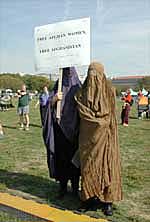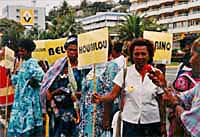Navigation
 Home
Home
 WHO WE ARE
WHO WE ARE
 OUR DEMANDS
OUR DEMANDS
 OUR ACTIONS
OUR ACTIONS
 OUR MAIN FIELDS OF ACTION: The Common Good and Access to Resources, Peace and demilitarisation, Women's Work and Violence against Women
OUR MAIN FIELDS OF ACTION: The Common Good and Access to Resources, Peace and demilitarisation, Women's Work and Violence against Women
 Become a member
Become a member
 News
News
 Agenda
Agenda
 Structure: IC, Countries and Participating bodies, International meetings
Structure: IC, Countries and Participating bodies, International meetings
 Newsletters
Newsletters
 Publications
Publications
 2000 - Sexism and Globalization, 2000 Good Reasons to March
2000 - Sexism and Globalization, 2000 Good Reasons to March
 2003 World Social Forum
2003 World Social Forum
 A Change of Course, The Millenium Development Goals (MDGs) through the Lens of the Women's Global Charter for Humanity, August 2005
A Change of Course, The Millenium Development Goals (MDGs) through the Lens of the Women's Global Charter for Humanity, August 2005
 A Score for Women’s Voices
A Score for Women’s Voices
 Advocacy Guide to Women's World Demands, 2000
Advocacy Guide to Women's World Demands, 2000
 Appeal of the World March of Women for the Construction of a Just, Equal, Cooperative, Democratic and Peaceful World
Appeal of the World March of Women for the Construction of a Just, Equal, Cooperative, Democratic and Peaceful World
 Changing the World Step by Step, 2000
Changing the World Step by Step, 2000
 ECONOMICS IN QUESTION: A WOMEN’S PERSPECTIVE
ECONOMICS IN QUESTION: A WOMEN’S PERSPECTIVE
 G8 AND WOMEN: WORLDS APART
G8 AND WOMEN: WORLDS APART
 Information about demand V-6 concerning sex trafficking of women and girls
Information about demand V-6 concerning sex trafficking of women and girls
 Information Document on Lesbian Rights (1999)
Information Document on Lesbian Rights (1999)
 Letter to Kofi Annan, UN General Secretary, October 17, 2000
Letter to Kofi Annan, UN General Secretary, October 17, 2000
 Letter to the IMF and the World Bank, October 16, 2000
Letter to the IMF and the World Bank, October 16, 2000
 Supporting Document 1 to the Charter
Supporting Document 1 to the Charter
 Supporting Document 2 to the Charter
Supporting Document 2 to the Charter
 The World March of Women 1998-2008: A Decade of International Feminist Struggle
The World March of Women 1998-2008: A Decade of International Feminist Struggle
 The World March of Women 2010 - Third International Action
The World March of Women 2010 - Third International Action
 WMW at the Global Forum on Financing the Right to Sustainable and Equitable Development
WMW at the Global Forum on Financing the Right to Sustainable and Equitable Development
 Women on the March, 2002
Women on the March, 2002

|
April 2002 - Snapshots of Home and Elsewhere - Asia-Oceania
 |
|
In defense of Afghan women
News from Central Asia was more sporadic. The campaign to assist Afghan women, who have been silenced, censured, denied freedom of speech, access to education, and full citizenship, was conducted outside the country. Lifting her burqa in the October 17 meeting at the UN, an Afghan woman denounced arms trafficking and the dominance of economic interests over all others. "Nowhere are the devastating effects of this toxic combination more evident than in Afghanistan," she said.
|

The situation of Afghan women is denounced on the march in Washington, October 15, 2000.
(Photo Joane Mc Dermott) |
On September 11, 2001, the situation of Afghan women suddenly took centre stage. All women's movements condemned the attacks, called for peace and mobilized to increase efforts to defend women in this country.
Women's resistance groups in neighbouring countries, Pakistan, in particular, have waged this campaign from the beginning. Violence and the social condition of women were the focus of actions conducted in this country.
In New Zealand, women of the teachers' union initiated a project known as NZEI Te Riu Roa or "Water to Learn." The goal of this project is to finance safe drinking water for a school or children's centre in the Pacific. Freed of the task of fetching water, girls have the time to go to school.

In New Caledonia, the March was a means of expression for Kanak women. |
In New Caledonia, women circulated a "manu," (a piece of cloth) coloured yellow, like the sun, to symbolize the voices of women. This action continued in 2001, centering on five demands: the creation of a women's centre in each commune, universal family benefits, a network of universally accessible day care services, an awareness-raising campaign on sexual equality, and the creation of status of women committees in all the Island's institutions. |
In Fiji, where there was a coup d'état in 2000, women concentrated on gathering signatures.
Finally, Australian women carried out a wide variety of actions: music and dance festivals, picnics, and a virtual bus tour on wife assault. Women denounced poverty, calling for "fair trade," and they demanded the respect of labour rights and a denuclearized Pacific.
|

|
Copyrights
:
CC by-nc-sa 2.0
Last modified
2006-03-23 03:09 PM
This item is available in
Français,
English,
Español
|
|





